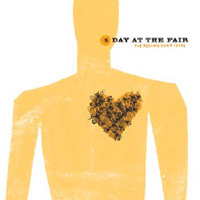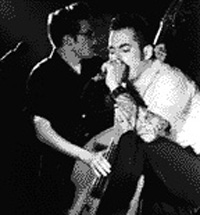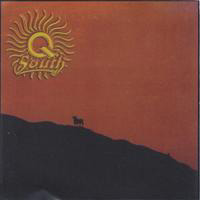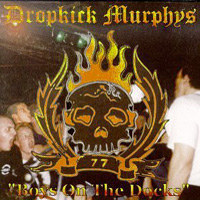 Dropkick Murphys
Dropkick Murphys
Boys on the Docks (Cyclone)
An interview with Ken Casey (bass) and Matt Kelley (drums)
by Scott Hefflon
photos by Kris Gullage
“Boys on the Docks,” the title track to this six-song CD, is really good, really catchy. Is it a new song, or was it released on a 7″?
Ken: It’s brand new. It’s about my grandfather, John Kelley. He organized most of the union workers down on the fish pier. We’ve been playing it for a while, but now that it’s on the CD, it’s become popular really quickly. We came home from California and we hadn’t played since the record came out in Boston, but when we played it, everyone knew all the words already.
“Caps and Bottles” is my other favorite song.
Matt: Those seem to be people’s favorites. They’re the two newest songs.
Ken: Three of the six songs were on a 7″ put out by Cyclone Records called Fire and Brimstone. We sold out the first pressing in a month, and they were going to re-press it, but they’d been asking us all along to do a CD. So we decided to use those songs again along with a few new ones we’d written. We’d released five or six singles and splits, but we had no CD.
What songs were on the 7″?
Ken: “Eurotrash,” “Front Seat,” and “Never Alone.” “Never Alone” was re-recorded and sped up a bit.
Do you see a growth in the new songs, any stylistic change?
Ken: I think we’re all over the road musically. We definitely have the side that comes from sing-along Irish drinking punk rock, but then we’ll write a song that’s really old Boston hardcore, then another song that’s totally ’77 punk.
Matt: But they all have similarities, they all have something in common.
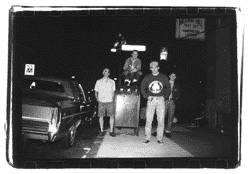 Is there any one style you like the best? I’d have to put my vote in for the Irish sing-along punk about unity and growing up with friends.
Is there any one style you like the best? I’d have to put my vote in for the Irish sing-along punk about unity and growing up with friends.
Ken: I think that’s what we’ve gotten the most notoriety for because the style isn’t heard too often. That part of us just comes out without us trying, those are the songs that just happen. The other songs we have to try to write. People say they want more of those songs, but on the other hand, we don’t want to become cliché and play one specific style. We’re a punk band, but our roots are in Irish folk.
Do you find that you attract a hard drinking crowd?
Matt: A drinking crowd, but not necessarily hard drinking.
Ken: We attract a young, under age audience so it’s really tough to say. Most of our shows are all age, so our crowd would have to swing their pint glasses in the parking lot before or after the show. They seem to enjoy the drinking-style songs though. Most of the songs are about our lives, and we’ve had more people say that they could relate with the lyrics than I ever could’ve hoped. Some of our songs are positive, but a lot of them tend to be kinda bleak. It’s cool to write about what’s going on in your head, even if it’s kind of a depressing topic, and then find out other people feel the same way. It’s the whole blue-collar punk rock thing people can identify with.
Did all you guys grow up in Quincy, MA?
Matt: I’m from Leominister.
Ken: Matt joined the band a few months ago, just in the nick of time.
Matt: I’m not on any of the tracks on Boys On The Docks, but I’m on the full-length we recorded in June.
Ken: We all grew up in Quincy, Milton, Dorchester, and we have the same line-up except our original drummer was Bill Close from The Freeze. That’s when we were still down in the basement thinking we’d never get out and play in a club. Then we had another friend of ours, Jeff “The Shark” Erner, an old-time Boston punk rock drummer for most of our recordings. Then when things got hectic and he couldn’t do it, Matt came in and fit in perfectly. Matt’s an Irishman and he was ready to go full time. And he can play the drums pretty good, which helps.
Is it a requirement that you be Irish to be in the band?
Ken: No, but it helps.
Matt, you recorded on the full-length, but did you write any of it?
Matt: I wrote the music to one song, is it still called “Memories Remain” or did we change it to “Friends Like You?”
Ken: That’s still up in the air.
Matt: It’s a song. Whatever. I wrote that. And I think I helped write some of the other stuff.
Ken: Before, when Jeff was in the band, he was just into playing drums. Matt can play bass, too, so now the songwriting process involves all of us. When we started this band, I’d been playing bass for three weeks, Mike had never sung before, and Rick had never been the only guitarist in a band, so we really needed a solid drummer. We tried out a lot of drummers, and when Matt tried out, after two songs we knew he was in the band. Plus he knew all the songs.
Matt: Actually I only knew two of ’em.
Ken: You told us you had them all memorized.
Matt: The day after you guys called me I locked myself in the basement and learned eight songs.
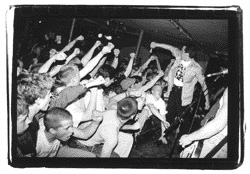 How many songs are on the next record?
How many songs are on the next record?
Matt: 16.
Ken: Eight of ’em are re-recorded versions of songs we’ve already released. Most of our singles never made it out of Massachusetts, so we really wanted to get them out. Eight brand new songs is still a lot of material. And the recording is much better, too. Before, we’d be so gung-ho to get new material out that the minute we had a new song we’d put it out. We’d gotten a lot of offers to do 7″s, so as soon as we had the songs ready, we’d go into the studio and do them. When they came back, we’d cringe a bit. So this time it was really nice to go back and do things right.
Didn’t Lars Frederiksen have something to do with the album?
Ken: He flew out here and produced the album for a big ol’ donut paycheck. We aren’t supposed to tell people that ’cause he’s a humble guy, but I’ve got to do my Lars Frederiksen speech here.
Matt: Do it.
Ken: People give Rancid so much crap and they always want to take them down, but I tell ya, they are the most down to Earth guys I know. Lars came out here and produced our record for free during the two weeks he had off from his band. The only thing he asked for was a place to stay and some food. He stayed on our couches, and he bought us food. He put serious time and effort into our record. We really didn’t know how to get the sounds we wanted, but he just went in and did it. Not to mention he just plain is a good guy.
Matt: A quality individual.
How’d you end up being one of the first few bands signed to Hellcat Records?
Ken: We put out a compilation (on Flat Records), I’ve Got My Friends, which was a Boston/San Francisco split with our friends the Swingin’ Utters. At the time we put it out, I think Max from the Swingin’ Utters was living at Lars’ house. We were talking to Taang! and we were thinking about signing to them, and they kept saying Lars was going to produce the CD. I sent a package to Lars to see if he was really interested, and it apparently went through the hands of Tim Armstrong who runs Hellcat. In the meantime, our relationship with Taang! had quickly soured, and we took the advice of some other bands who’d had dealings with them, so let’s just leave it at that. A couple weeks later, Tim called us and offered us a slot on the Give ‘Em The Boot comp. They’d expressed interest in us, but being a new label, I think they were feeling the ground out a bit, figuring out what they really wanted to do. Then we got a call a week or two later, and they offered us a deal.
How was the deal?
Ken: Actually, I don’t think we’ve signed the papers yet. We mostly wanted the distribution world-wide. Hellcat gets the same distribution Epitaph does, but I feel more of a musical affiliation with the bands on Hellcat than I do with the bands signed to Epitaph. Hellcat is mostly traditional ska, and the only other punk band is US Bombs. The first show we played with them in California, Dwayne Peters, the singer, smashed a shot glass on his forehead during the first song, then bled profusely through the whole set. They’re one of the few truly dangerous punk rock bands left. And while I’m not a huge ska fan, I love the ska bands that are on Hellcat. We’ve played mixed bills before, and while a lot of hardcore shows haven’t worked at all, we’ve played ska shows and they’ve gone over great.
It’s also smart to first sign to a small label with major distribution than potentially get swallowed up by a major label before you even get your feet wet.
Ken: We listen to all the kids who can spend days talking about what bands are on what label, and I’ve just got one thing to say: We’re a blue-collar punk rock band, and we could go sleep in the dirt, not pay our bills, and drive around in a van and have a blast, but some of us have families and kids to think about. We have responsibilities and our priorities have to include the needs of people other than ourselves. If we claim to be a working class band, than we have to work just like anyone else. This is our job.
Matt: It’s do or die from here on out.
Ken: That’s the name of our record,Do Or Die.
Matt: There’s no turning back. We all quit our jobs, so we have to make this work. Kids can slag us if they want, but they have jobs and careers lined up. This is what we have. This is what we do.
Tell me about the tour coming up with the Mighty Mighty BossTones.
Ken: It’s funny, we’d just made a decision to do our own thing and not take opening slots for Epitaph bands. We’re kinda isolated, being on the East Coast, and we’ve been doing really good to get the following that we have. We wanted to book our own tour, but we came back from California, and we were really struggling. We don’t have a booking agent or manager or anything, and then the call came in from the BossTones. We’ve known them for a long time, and they said they were putting together a tour of all Boston bands, and we couldn’t say no. I don’t know if we’re going to be playing to the crowd we’re used to, but the experience alone is worth it. The Royal Crowns are good friends of ours. Dan, the singer for Bim Skala Bim, his other band, Steady Earnest, played at my wedding. There’s a connection between all the bands on that tour.
Any bands you want to mention? Bands from this area you like playing with?
Ken: Ducky Boys, All Systems Stop, The Trouble, 30 Seconds Over Tokyo, Showcase Showdown – that’s the scene we play in, those are the bands we play with. We’ve had the opportunity to get out and tour, but our hearts are in playing with those bands. The scene in Boston is so good, it’s just overshadowed because the bands are young and they haven’t gotten out and toured. But when they do, this place is going to explode.

